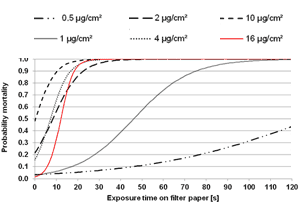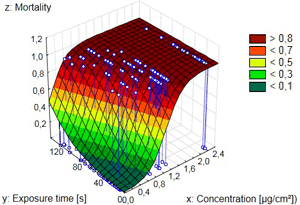
Product development
Insect Services offers support with the registration of biocides according to the Biocidal Product Regulation (BPR, Regulation (EU) 528/2012).
We test insecticides, acaricides, repellents and attractants (product groups PT 18 and 19) according to international standards of the US Environmental Protection Agency (EPA) and guidelines such as the Technical Notes of Guidance (TNsG) of the European Commission or the guidelines of the World Health Organization (WHO) and the Organisation for Economic Co-operation and Development (OECD) and others.

MOB: Mortality of I. ricinus nymphs in relation to exposure time of the ticks on the impregnated filter paper at different concentrations of active ingredient 
MOB: Calculated mortality of ticks (vertical z-axis) with respect to tick exposure time of the ticks on the impregnated filter paper (x-axis) and the different concentrations of active ingredient (y-axis), according to the logistic regression analysis
We have developed a number of bespoke test systems that are specifically designed for the species we work with. If there are no suitable test systems available for specific demands, we can develop our own standards. For example, we developed an effective test for evaluating tick repellents that is highly standardized and yet yields results that are quite close to results obtained when using human volunteers. Thus, the moving object bioassay (MOB) developed by us is excellently suited for screening tests and dose-response studies of potential active substances. We also offer testing of ready-to-use products under field conditions outside the lab:
- Ticks and mites
- Ixodes ricinus (Castor bean tick)
- Dermacentor reticulatus (Meadow tick)
- Dermacentor marginatus (Ornate sheep tick)
- Rhipicephalus sanguineus (Brown dog tick)
- Hyalomma marginatum (Mediterranean bont-legged tick)
- Dermatophagoides pteronyssinus (House dust mite)
- Dermanyssus gallinae (Poultry red mite)
- Insects
- Tineola bisselliella (Clothes moth)
- Musca domestica (Common house fly)
- Blattella germanica (German cockroach)
- Periplaneta americana (American Cockroach)
- Pediculus humanus humanus (Clothes louse)
- Lepisma saccharina (Silverfish)
- Attagenus unicolor (Black carpet beetle)
- Lasius niger (Black garden ant)
- Cimex lectularius (Bed bugs)
- Ctenocephalides felis (Cat flea)
- Vespula gemanica (German wasp)
- Vespula vulgaris (Common wasp)
Please contact us for execution of efficacy test with other species like spiders, fire bugs or for example woodlice.
